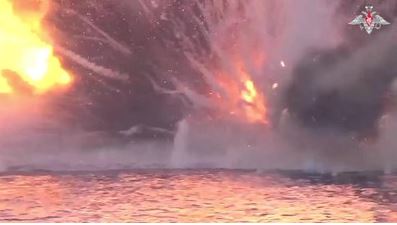
The ongoing conflict in Gaza between Israel and Hamas is generating second and third-order effects that have impacted countries far beyond the Middle East. The war has led to both challenges and opportunities for Ukraine in its fight against Russia, which invaded Ukraine for a second time in February 2022. Inevitably, the war in Gaza has drawn away both attention and resources from Ukraine, as U.S. bandwidth is occupied by supporting Israel with military and economic assistance. Following the Hamas terrorist attacks of October 7, U.S. and Western diplomatic attention has also been diverted away from Ukraine and toward Gaza. The longer the war in Gaza drags on, the worse it will be for Ukraine. As Ukrainian President Volodymyr Zelensky said in an interview with the France 2 television channel, “If international attention turns from Ukraine, one way or another, it will have consequences.” Zelensky traveled to Washington D.C. last week to meet with U.S. President Joseph Biden and members of Congress, a crucial visit at a time when support for continued military aid to Ukraine is declining, especially among certain segments of the Republican party. Continued aid to Kyiv is a contested issue within U.S. domestic political circles, with tensions certain to increase during an election year.

In early December, Republican lawmakers blocked an emergency spending bill that would have funded the war in Ukraine, arguing that new border restrictions be included in any legislation that sent additional assistance to Kyiv. Linking immigration to aid for Ukraine torpedoed the proposal and will postpone crucial decisions until after the new year. Heading into an election year, there is attenuating support for continued financial support without strings attached. Between war weariness and donor fatigue, Ukraine’s war effort could be in serious jeopardy next year, a development that would be a major boon to the Kremlin, which never passes up an opportunity to highlight issues that divide the West while accusing Washington and Brussels of hypocrisy. Moscow has consistently reinforced the narrative of a Western double standard in how the U.S., the EU, and their respective allies deal with the war in Ukraine versus how they approach the conflict in Gaza. July polling data from a CNN poll conducted by SSRS, a social science research firm, showed that more than half of Americans polled (55 percent) believe that the U.S. Congress should not authorize additional funding to support Ukraine. Slightly more than half, 51 percent of Americans polled, believe that the U.S. has “done enough” to help Ukraine. Speaking recently, U.S. national security adviser Jake Sullivan commented, “A vote against supporting Ukraine is a vote to improve Putin’s strategic position.” It’s a proposition that Russian President Vladimir Putin himself seems to agree with, suggesting in October that Ukraine would not be able to survive for more than “a week” without continued robust military and financial aid from the U.S. and the West.

On the diplomatic front, Ukraine wants to remain closely aligned with Washington’s position on the Gaza conflict but must pull off a delicate balancing act—aligning with the U.S. position on support for Israel, while also being careful not to alienate large swaths of the Global South. For its part, Israel has tried to walk a similar tightrope, providing humanitarian aid and limited supplies of air raid warning systems to Ukraine, while attempting to avoid antagonizing Moscow. Russia has courted the Global South throughout the conflict in Gaza and even hosted leaders from Hamas shortly after the October 7 attacks, angering many in Israel. The war in Gaza has also offered Moscow and Tehran the opportunity to cooperate further and cement their relationship. For its part, China has adopted a pro-Palestinian stance, which generally aligns with Russia’s approach. Russia’s continued influence with certain countries in the European Union (EU), especially Hungary, will also further impact Ukraine. Speaking yesterday at a news conference, Hungarian Prime Minister Viktor Orbán said that he believes funding for Ukraine should not be granted from the EU budget, going on to proclaim, “I am convinced that to give Ukraine 50 billion euros from the EU budget for five years…That’s a bad decision.”
There could be some opportunities that arise from the war in Gaza that could stand to benefit Ukraine. For example, if the demand for weapons and ammunition becomes so great that it catalyzes military-industrial development, that would also be helpful for Kyiv. Convincing Americans of the continued necessity of providing assistance to Ukraine might be difficult, but there are some compelling arguments to be made, especially in an election year when voters will be looking for more information on the benefits of such an aid program. A declassified report by the U.S. intelligence community assessed that since the war in Ukraine kicked off nearly two years ago, the Russian military has suffered 315 thousand dead and injured troops, or nearly 90 percent of the personnel under its command when the war began. Those numbers are staggering. Without becoming involved with boots on the ground, through its ongoing military support (training, advice, equipment) to Ukraine, the U.S. has significantly weakened one of its leading adversaries in what could amount to a strategic victory in an era of great power competition. Kyiv is hoping that the war in Gaza winds down soon, fearful that a protracted conflict will continue to siphon attention and resources away from its own military campaign, which some analysts argue is mired in a stalemate and in danger of fading from the headlines altogether.





